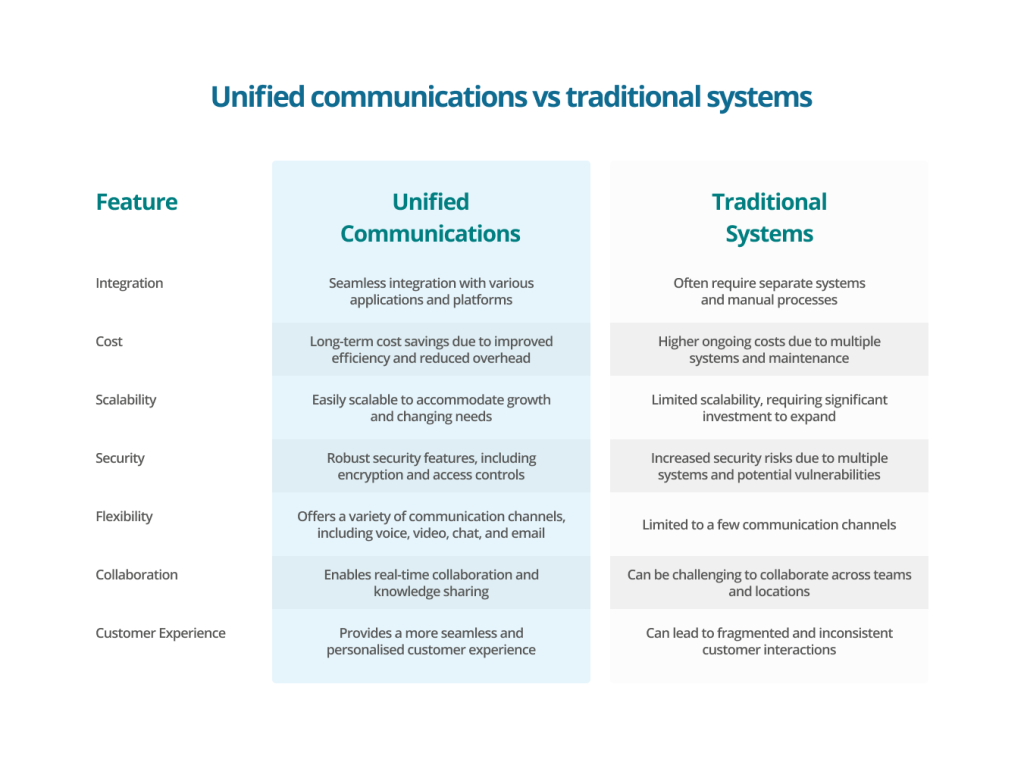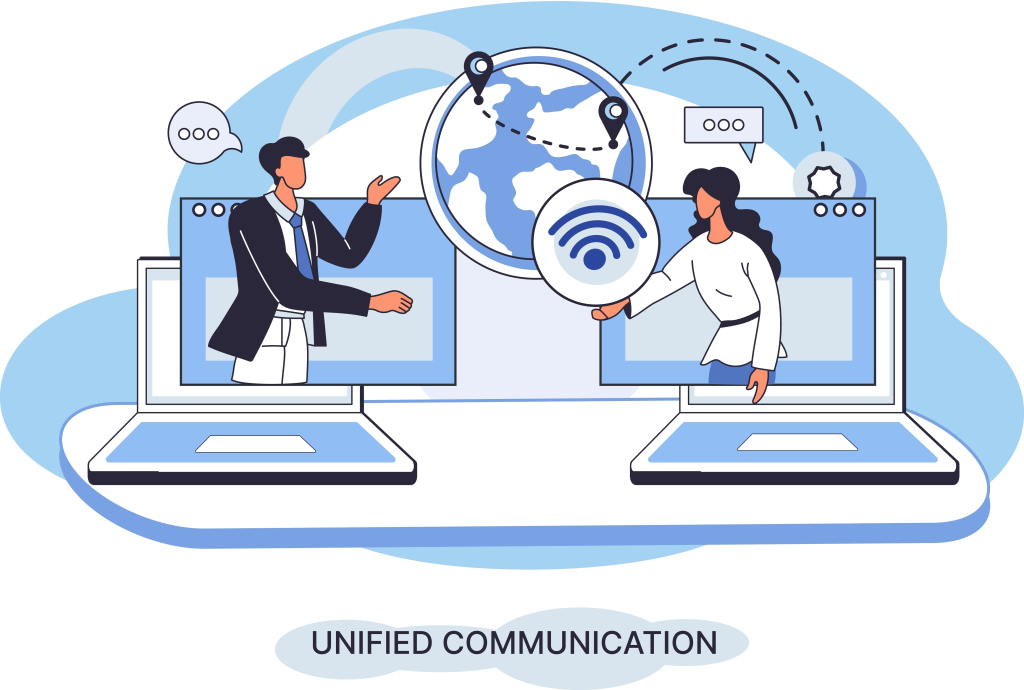Navigating Travel Industry Risks with Intelligent Communications
We’re going to explore some real-life unforeseen circumstances that the travel industry has had to navigate and how intelligent communications solut...
With utility companies in the UK generating over £400 billion in revenue in 2022, according to data from Research and Markets, it’s safe to say business is booming.
However, without streamlined communications systems in place, businesses can suffer from disjointed communications across departments and fail to serve customers properly.
In the age of cloud computing and cloud telephony, unified communications (UC) systems offer a standout solution to help businesses of all shapes and sizes streamline their communications internally and externally.
But it’s far more than a simple phone system.
A UC solution condenses all the communications tools a modern business needs – including voice and video calls, text, instant messaging, unified messaging, email, video conferencing, file transfers and collaboration tools – into a single, easy-to-use application.
Integrate with existing digital communication tools, such as the wildly popular Microsoft Teams, to create a truly all-encompassing and versatile communication system.
But how precisely can UC solutions be of specific service to companies in the utilities sector?
At Elite Group, we’re industry experts with decades of combined experience providing business technology solutions, including unified cloud communications. Get in touch with an Elite Group expert today to find out how the solution could benefit your company, or keep reading to learn more.
Given they’re charged with offering essential services such as gas, water and electricity to millions across the country, utility companies have access to sensitive customer data, including financial data.
Upholding stringent cybersecurity tools and adhering to relevant compliance regulations, to keep this information out of the hands of criminals is essential.
Modern antivirus tools are effective, but they aren’t enough to eliminate the threat of data being stolen through phishing and similar methods.
Phishing is the process by which criminals contact a worker (most often via email) claiming to be a fellow colleague or someone of influence in the company. The employee is then instructed to offer up sensitive login information, such as email addresses and passwords, or to click a malicious link disguised as something innocent.
Success may sound unlikely but given up to 88% of data breaches are caused by human error – with approximately 45% of people falling for phishing scams due to being distracted, according to data in a report by Stanford University, the need to limit the effectiveness of this technique is clear.
With 7% of large companies still running 6 or more major methods of communication, according to Elite Group research, employees at such companies are at greater risk of falling for a phishing scam.
Unified communication could lower this risk.
Because all communications tools are housed within a single application, attention can be better focussed – and the odds of spotting and reporting a phishing scam are greatly increased.
Plus, because it is easy to determine whether an email has come from an internal UC user, it’s easier to spot false emails claiming to be from someone within the same system.
But beyond avoiding phishing attempts, unified communications systems also come packed with their own robust security tools and features.
All data stored within the platform is encrypted, meaning data is scrambled and only decodable by authorised users with the correct access key.
Multi-factor authentication is also in use, demanding the user confirm their identity on a separate device before they’re able to access the platform. This guarantees only authorised users will ever be able to access the cloud communications platform, giving business and company data the most ironclad security possible.
For more information on how a unified communications system could bolster your utility company’s security efforts, speak with an Elite expert today.

According to customer service experts Hyken, 90% of customers say they would happily switch to an alternative provider if a better customer experience was available.
With 80% of companies expecting to compete with each other from a customer service standpoint, according to data from Gartner, it’s clear utility businesses need to be doing everything they can to ensure their customer experiences are head-and-shoulders above the competition.
Sadly, though, too many companies’ interactions are marred with ineffective systems that fail to offer the smooth, instant access to customer data that customer service representatives need.
Unified communications systems are fast and reliable.
Because the technology is cloud-based, it is not stored on legacy on-site hard drives and servers which may be slowing the entire operation. Rather, in the case of UCaaS (Unified Communications as a Service), they’re managed on external servers hosted by a third-party provider, who ensure the technology is up to the task of offering a speedy and reliable service.
Call answering, call transfers and any other call-related tasks are also simplified on unified communications systems. As the system is not reliant on outdated hard lines – which will be deactivated when the PSTN switch-off occurs in 2027 – it is not plagued with the same issues traditional phone lines can experience.
HD calling, achieved through Voice Over Internet Protocol (VOIP) technology which powers unified communications, offers crystal-clear vocal clarity for both the caller and service representative, helping to create a more pleasing and productive call.
Better still, in the case of answering a customer call, representatives can quickly and accurately access customer data and speak to a customer all through the same system, rather than relying on multiple applications.
All businesses need to run efficiently and given the financial scrutiny utility companies are under from the media, it makes sense they should look to reduce unnecessary spending.
Communications is one area utility companies often overspend without needing to.
Communication tools often result in monthly subscription costs which, as the number of tools continues to rise, can represent huge monthly costs.
This is arguably where unified communications systems are the most useful. Consolidating all the tools a modern business needs into a single cloud-based application, from a single provider, there is only ever one monthly price to pay on communications spending.
Not only can this save utility companies money, but it also simplifies monthly spending and can ease the pressure on finance managers.
Maintaining consistent and reliable communications across multiple locations can be a struggle for many businesses. But for utility companies specifically, the need is key.
Depending on their size, utility companies may be spread across numerous offices, both nationally and internationally. It is often the case that each individual office may choose to operate under its own protocols and disparate systems, as this is what is most convenient for them, or they may opt to stick with the communications systems they’ve always used for familiarity.
But this doesn’t aid business continuity and could cause confusion when two separate branches need to work together.
However, if all branches were to work under the same unified communications platform, with access to all the same tools, communications would be completely streamlined across the board.
The same is true for remote and hybrid workers.
Depending on the nature of their role, an employee may be required to travel to numerous utility offices or on-location sites.
As long as a worker has the unified communications application installed on the relevant digital device (a smartphone, tablet or laptop) and they have a stable internet connection (including mobile data connections) not only will they be able to communicate effectively with those in the office and others in the field, but they’ll have all the same advantages as their office-based colleagues.
Additionally, any updates from remote workers saved in the unified communications system are instantly accessible to relevant employees, no matter where they are.

If a unified communications solution sounds like the innovation your utility company needs to improve productivity, cut costs, and provide a first-class customer experience – speak to Elite Group today.
With decades of combined experience in the business technology space, including business communications and other innovative solutions, we can offer you the most comprehensive unified communications packages and communications support.
You’ll be assigned a dedicated account manager who will oversee the onboarding of your new communications tools, as well as offer any post-installation assistance you may need to make the most out of your new technology.
Plus, with round-the-clock technical support available, you will always have access to the information you need to solve issues and remain productive, no matter what hours you work.
To find out more about our unified communications services, get in touch with Elite Group today.